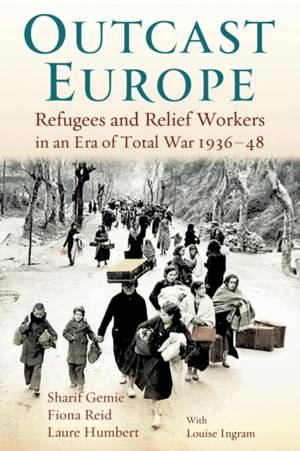
- Afhalen na 1 uur in een winkel met voorraad
- Gratis thuislevering in België vanaf € 30
- Ruim aanbod met 7 miljoen producten
- Afhalen na 1 uur in een winkel met voorraad
- Gratis thuislevering in België vanaf € 30
- Ruim aanbod met 7 miljoen producten
Zoeken
Outcast Europe
Refugees and Relief Workers in an Era of Total War 1936-48
Sharif Gemie, Laure Humbert
Paperback | Engels
€ 83,45
+ 166 punten
Uitvoering
Omschrijving
The period of the 'long' Second World War (1936-1948) was marked by mass movements of diverse populations: 60 million people either fled or were forced from their homes. This book considers the Spanish Republicans fleeing Franco's Spain in 1939, the French civilians trying to escape the Nazi invasion in 1940, and the millions of people displaced or expelled by the forces of Hitler's Third Reich. Throughout this period state and voluntary organisations were created to take care of the homeless and the displaced. National organisations dominated until the end of the war; afterwards, international organisations - the United Nations Relief and Rehabilitation Agency and the International Refugee Organisation - were formed to deal with what was clearly an international problem.
Using case studies of displaced people and of relief workers, this book is unique in placing such crises at the centre rather than the margins of wartime experience, making the work nothing less than an alternative history of the Second World War.
Using case studies of displaced people and of relief workers, this book is unique in placing such crises at the centre rather than the margins of wartime experience, making the work nothing less than an alternative history of the Second World War.
Specificaties
Betrokkenen
- Auteur(s):
- Uitgeverij:
Inhoud
- Aantal bladzijden:
- 344
- Taal:
- Engels
Eigenschappen
- Productcode (EAN):
- 9781441102447
- Verschijningsdatum:
- 19/01/2012
- Uitvoering:
- Paperback
- Formaat:
- Trade paperback (VS)
- Afmetingen:
- 155 mm x 231 mm
- Gewicht:
- 566 g

Alleen bij Standaard Boekhandel
+ 166 punten op je klantenkaart van Standaard Boekhandel
Beoordelingen
We publiceren alleen reviews die voldoen aan de voorwaarden voor reviews. Bekijk onze voorwaarden voor reviews.







